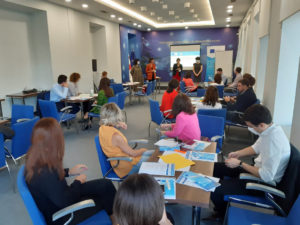
Technical Assistance for Implementation of Civil Society Dialogue and Civil Society Support Programmes (TR2015/DG/01/A5-01/001)
The overall aim of the project is to increase bilateral exchanges and cooperation between CSOs in Turkey and the EU at local, regional and national levels, to promote awareness raising initiatives on importance and benefits of membership of Turkey to the EU within Turkey and EU and on

Technical Assistance for the Capacity Building for the Ministry of European Integration and Line Ministries for the Preparation of the Negotiation Process and Legal Approximation (SMEI IV)
Albania became an EU candidate country following the European Council’s decision in June 2014. The integration process is underway in line with the priorities set out in the Stabilisation and Association Agreement (SAA) and the EU’s Enlargement Strategy. The purpose of this project is to assist the Albanian

Local Experts for Monitoring the Grant Contracts Being Implemented Under the Reproductive Health Programme
The financing agreement for the “Programme of Reproductive Health in Turkey” (RHP) was signed in December 2001 and started in January 2003. Within the context of the programme’s grant component, based on two calls for proposals, 88 projects were awarded a total value of €19.9 million. External assessors

Facility for the Implementation of the EU-Georgia Association Agreement- II
The project aims to strengthen the capacity of public institutions in Georgia to meet the country’s commitments under the EU-Georgia Association Agreement (AA), including the Deep and Comprehensive Free Trade Area.

Technical Assistance on Mental Health Care and Drug Addiction Treatment Services in Prisons
Mental health and drug addiction are challenges for penitentiary systems all over the world. The purpose of this project was to tackle these issues in Turkish prisons and to bring the country’s penal services into line with international and European standards.

Technical Assistance for Supporting the Solution of Economic and Social Integration Problems in Diyarbakır, Şanlıurfa, Gaziantep, and Erzurum, as Major In-Migrant Destinations
Rapid migration in major urban areas, namely Diyarbakır, Şanlıurfa, Gaziantep and Erzurum (DGES), have adverse impacts in Turkey. To reduce these unfavourable effects, EKOSEP aimed to support social integration and environment-related infrastructure problems due to migration in the selected provinces in a multi-actor manner. Furthermore, it aimed to

